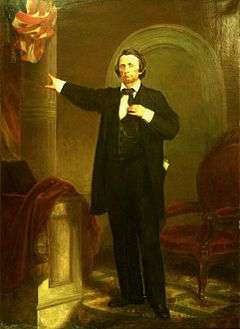Douglas Henry
| Douglas Henry | |
|---|---|
| Member of the Tennessee Senate from the 21st district | |
|
Assumed office 1971 | |
| Personal details | |
| Born |
May 18, 1926 Nashville, Tennessee |
| Political party | Democratic |
| Residence | Nashville, Tennessee |
| Alma mater | Vanderbilt University |
| Profession | Attorney |
| Religion | Presbyterian |
Douglas Henry (born May 18, 1926) is a Tennessee politician and former member of the Tennessee Senate representing the 21st district, which is composed of part of Davidson County. He served as a state senator since the 87th General Assembly, prior to which he was a member of the Tennessee House of Representatives during the 79th General Assembly. He served as Vice-Chair of the Finance, Ways, and Means Committee, in addition to his membership of the Senate Ethics Committee and the Fiscal Review Committee.
Early life
Douglas Henry graduated with a B.A. and LL.B from Vanderbilt University. He is a former chairman of the Southern Legislative Conference, an organization that states its mission is to "foster and encourage intergovernmental cooperation among its 16-member states." He was re-elected that office in 2006.
Tennessee General Assembly
Henry was first elected to the Tennessee House of Representatives in 1954. Henry was absent from politics during the 1960s when his children were small, working as a corporate attorney for National Life Insurance Company, of which his father was a founder. Returning to the political arena in 1970, Henry was elected 11 consecutive times to the Tennessee State Senate, most recently narrowly defeating challenger Jeff Yarbro in the 2010 primary by just 17 votes.[1]
1987 opposition to display of Gov. Brownlow portrait

Henry was a member of the Capital Commission on April 20, 1987 when he objected to official Civil War era portrait of William G. Brownlow --- Tennessee's radical newspaper publisher, noted book author, American Civil War-Reconstruction Era Tennessee governor, and U.S. Senator --- being displayed for the first time at the Tennessee Capitol, and more specifically, from being displayed within the public area of the Legislative Library among notable portraits of Andrew Jackson, Andrew Johnson and James K. Polk, the three U.S. Presidents from Tennessee.
While Brownlow was opposed to both the creation Confederate States of America and the Klu Klux Klan, Henry cited Brownlow's denying voting rights to Tennesseans (Brownlow proposed legislation that would prevent Confederate leaders from voting in Tennessee for 15 years and Confederate soldiers from voting in Tennessee for 5 years, all while Brownlow pushed through legislation through the Tennessee General Assembly giving African-Americans the right to vote) as a pretext for removing the then recently installed Brownlow portrait from the Tennessee Capitol building.[2]
William G. "Parson" Brownlow, began his career as a circuit rider in the 1820s and 1830s. Brownlow gained wide notoriety for his wild clashes --- both in person and in print --- with rival Baptist and Presbyterian missionaries and Christian sectarian authors across the Southern Appalachian region of the United States.[3] Brownlow's books detailing the Confederate States of America military occupation of his hometown of Knoxville, Tennessee, and his own time briefly spent in a Confederate prison during the American Civil War gained Brownlow a greatly expanded audience across the northern United States who were eager to purchase both his books and admission tickets for his northern U.S. speaking tour during the later years of the American Civil War.[4]
Not seeking re-election
After his District was drastically altered by the Republican Legislative majority he announced he would not seek re-election in 2014, instead opting to retire.[5] Yarbro, Henry's challenger in 2010, defeated current Tennessee Democratic Party Chair Mary Mancini in the 2014 primary and is the current Senator from the 21st District.[6]
References
- ↑ Rau, Nate (August 9, 2010). "Douglas Henry defeats Jeff Yarbro in District 21 state Senate race". The Tennessean. Retrieved 11 August 2010.
- ↑ http://www.nytimes.com/1987/07/19/us/in-tennessee-officials-fight-over-portrait.html "In Tennessee, Officials Fight Over Portrait". Special to the New York Times Published: July 19, 1987.
- ↑ "William Gannaway 'Parson' Brownlow," Tennessee Encyclopedia of History and Culture. Retrieved: 5 May 2014.
- ↑ http://www.nytimes.com/1987/07/19/us/in-tennessee-officials-fight-over-portrait.html "In Tennessee, Officials Fight Over Portrait". Special to the New York Times Published: July 19, 1987.
- ↑ http://www.nashvillescene.com/pitw/archives/2013/05/08/sen-douglas-henry-will-not-seek-re-election-in-2014
- ↑ http://www.tennessean.com/story/news/politics/2014/08/07/jeff-yarbro-holds-slight-lead-mary-mancini-senate-district-primary/13752501/